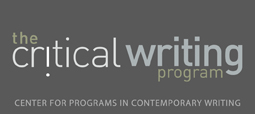Economics
An Overview of the Discipline
Economics is the study of how people make decisions and allocate resources in the presence of scarcity.
Writing in the Discipline
Goal
Economists who study theory act as scientists and attempt to explain the world. Economists who advise public policy attempt to improve the world. The primary goal of writing in the field is affirmation or critique of a position - pointing to a concept or interpretation and showing how it is correct or incorrect.
Reasoning
Depending on the context, reasoning may be either explanatory or justificatory. In the context of theory, reasoning is explanatory. Professor George Mailath, a theorist, explains that "a good explanation should persuade" because you want to interest people in your writing. In other areas, like public policy, reasoning is justificatory. Professor Petra Todd, a public policy advisor, notes that you should try to persuade people that your work improves on existing work, that your model is more effective than an existing model, and that your results are believable.
Evidence
All evidence must be logically coherent. The argument must be relevant in the particular setting, and correct. The data must be true. A quantitative field, Economists tend to use large databases, few personal interviews, large sample sizes, and precision.
Authorship
Economics is collective and collaborative. There is a clearly defined group working on an issue. Unique to economics, all authors are listed alphabetically because each one is considered to have contributed equally.
Claims
Certain topics, like individuals optimizing behavior, the assumption of rationality, and firm and individual utility maximization are generally regarded as premises in most economic fields. Some fields, such as behavioral economics, challenge the rationality assumption.
Writing Tips
The Writing Process
Writers should familiarize themselves with their audience. In public policy, writing addresses colleagues and the public. Different studies may reach similar conclusions. In theoretical economics, peer research adds to knowledge in Economics; the field is purely academic and not tailored to the public.
Reading many different papers and articles is a key way to develop an idea. Ideas will be further researched in a process may take anywhere from weeks to years.
Authors share drafts with peer academics to receive feedback. When submitting for publication, an author will submit his or her article to a peer-reviewed journal where the paper will be read by referees. These referees will ask the author to revise and resubmit the article or reject it for publication. Normally, this process for publication will take a lengthy period of time.
Writing Advice
- Check over your work and avoid making careless errors
- Write short, succinct sentences
- Write in a conversational tone
- Avoid leaping too quickly from data to a conclusion
Style
Tone should be objective and formal. In economic writing, there is little room for opinion. Technical language should be used only when necessary, and writers should avoid the use of figurative language. Short, succinct sentences are preferable to complex, dense sentences. Most writing will be done in English, the universal language of economics.
Genre
Typical Student Assignments
First-year and second-year undergraduates should not expect much writing. Professor Todd occasionally assigns group papers. Students will read articles on certain topics and write their reactions. In later works, students should have a strong foundation in mathematics. Professor Mailath explains "any decent economics writing is going to have some math in it."
Professional Writing
Professional Writing may involve the following structure: glossary, definition of the subject, introduction, a canonical model, two long-lived players, future directions, acknowledgements, and bibliography. Expect appropriate use of economic models and graphs.
© 2013-2014 The University of Pennsylvania
Meet the Professors

Professor George Mailath
"A tedious explanation, even if it is correct, is useless" More...

Professor Rebecca Stein
Professor Rebecca Stein enjoys writing that shows "clear expression of rigorous and analytical thinking" More...

Professor Judd Kessler
Professor Judd Kessler considers himself "a better editor than writer" More...

Professor Petra Todd
You want to persuade people that your work improves existing work, why your model should be liked more than an existing model, and why they should believe your results. More...

Professor Jere Behrman
Professor Behrman enjoys writing that shows an ability to write clearly for a broad audience. More...
